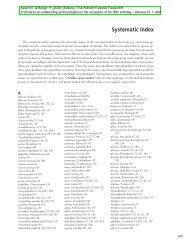abstracts der vorträge und poster - Technisches Büro für Ökologie
abstracts der vorträge und poster - Technisches Büro für Ökologie
abstracts der vorträge und poster - Technisches Büro für Ökologie
Sie wollen auch ein ePaper? Erhöhen Sie die Reichweite Ihrer Titel.
YUMPU macht aus Druck-PDFs automatisch weboptimierte ePaper, die Google liebt.
Burian, Alfred, University of Vienna, flinserl@hotmail.com<br />
Katzenberger, Marco, University of Lisbon<br />
BIODIVERSITY OF WATER-FILLED TREE HOLES IN KIBALE FOREST, A FRAGMENTED<br />
UGANDAN TROPICAL MOIST FOREST<br />
Water-filled tree holes in Africa have been so far widely neglected in research but are nevertheless an<br />
important temporal ecosystem for a number of different highly adapted aquatic and semi-aquatic<br />
organisms. In this study we tried to assess the biodiversity of these habitats and the abiotic factors that<br />
determine this diversity. The preliminary results showed high values for Simpson biodiversity index<br />
and Shannon evenness at family levels. Furthermore the investigated biotic and abiotic factors<br />
including hole volume, depth, temperature, pH, mass of detritus as well as tree diameter at breast<br />
height and canopy cover explained the individual numbers and family assembly of the vast majority of<br />
holes. Against expectations the dissolved oxygen levels did not show any impact on community<br />
structures.<br />
Crowl, Todd, A. National Science Fo<strong>und</strong>ation, Division of Environmental Biology,<br />
Long Term Ecological Research and Ecosystem Sciences, Washington, tcrowl@nsf.gov<br />
RIVERS, TREES AND SHRIMP: A VIEW OF A COMPLEX SYSTEM AFTER TWENTY YEARS<br />
OF LOOKING<br />
As part of NSF-sponsored Biocomplexity and Long-Term Ecological Research projects in Puerto<br />
Rico, we have been evaluating the interplay between terrestrial and aquatic energy flow. Over a<br />
twenty year research period, quantified the importance of the stream food web, dominated by<br />
freshwater decapods on ecosystem processes, including hurricane recovery across a series of<br />
watersheds. More recently, we have started to un<strong>der</strong>stand the roles human activities, such as land-use<br />
conversion, water withdrawal and road building, play in impacting the aquatic food webs and those<br />
linkages back to the terrestrial ecosystem. Our f<strong>und</strong>amental goal is to build a coupled socioecological<br />
modeling framework to un<strong>der</strong>stand local and regional processes and the feedbacks between<br />
human activities and ecosystem function.<br />
13



